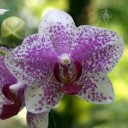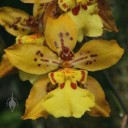Buy a Hybrid for Valentine’s Day
“Buy a hybrid” is good advice when you’re buying a car, and also when you’re buying an orchid. Hybrids are great choices for Valentine’s gifts, especially for people new to orchids. They’re easier to grow and have showier flowers than most species. You can check out orchid buying basics in my previous posts here and here. Below are 3 great examples of the thousands of hybrid varieties available, including a Phal, a Cattleya, and a Wilsonara.
For over a century and a half, orchid lovers have been crossbreeding different orchid species. Many resulting hybrids bloom with larger, more colorful, and longer-lasting flowers than their parent species; often they can survive some degree of abuse or neglect. New hybrids constantly top these remarkable standards.
Most orchids sold are hybrids. If you’re buying at a supermarket or big box store, it’s almost guaranteed that you’re purchasing a hybrid. The same hybrid vigor that allows mass-produced orchids to be shipped across oceans and highways guarantees you a tough plant. Many florists and garden centers carry only hybrids, however you can ask which are hybrids and which are temperamental species. You’ll probably only encounter orchid species at some florists and online vendors like Andy’s Orchids, a species specialist. If you want to tackle the pickier needs of an orchid species, Andy’s is a great place to start. But unless your valentine is an experienced orchid grower, stick with hybrids. Remember that you should never take orchid species from the wild or buy wild orchids (it’s illegal, and the plants probably won’t survive the shock anyway.)
You can tell whether an orchid is a hybrid or a species by its name, but many orchids lack name-tags at all, and complicated hybrid names can be written incorrectly. If you’re ready to dive into understanding orchid names, take a deep breath and start here.
One more orchid buying tip: if it’s below freezing where you live, try not to expose unprotected orchids to the cold air. For some orchids, just a few seconds of freezing temps can kill the flowers or the plant. Cover the plant, heat your hybrid car, pull right up to the exit, and pack in your hybrid orchid.
Explore posts in the same categories: Buying Tips, Growing, Misc, Photos
Subscribe to the About Orchids Blog:
![]()



February 12th, 2010 at 6:59 pm
Go hybrids!
February 14th, 2010 at 10:26 pm
[…] Relax — it’s very likely that your gift is a tough hybrid, and with some basic orchid care info, it’s no harder to grow than other houseplants […]
February 20th, 2010 at 4:58 pm
great photos!
February 28th, 2010 at 9:25 pm
[…] new hybrid colors on a Cymbidium or an Epidendrum, or a fascinating Dendrobium species […]
March 2nd, 2010 at 9:30 am
Love that beautiful moth orchid!
March 8th, 2010 at 10:26 am
Very good advice beginners should only buy hybrid orchids because they are very easy to grow.
March 10th, 2010 at 3:42 pm
I can freeze orchids – vanilla ice cream!
March 28th, 2010 at 8:04 pm
[…] beginners often grow easier hybrids instead of fussier species, but this species is an easy grower and a reliable bloomer.[…]
April 4th, 2010 at 2:34 pm
[…] I’ll concede that some tough hybrids can handle ice water, but most other orchid varieties cannot. […]
May 4th, 2010 at 9:34 pm
[…] Masdevallia coccinea has been used as a hybrid parent for decades, and its characteristics appear in many modern orchid hybrids. […]
August 19th, 2010 at 8:55 am
[…]Harlequins are a class of Phal hybrids developed by orchid breeders in recent years.[…]
October 10th, 2010 at 8:42 pm
[…] Its small size, tolerance for cold, and close relation to the Phal and Vanda families make it a popular choice as an orchid hybrid parent. […]
December 6th, 2010 at 11:30 am
[…] The Odont family includes over 100 species and countless human-made hybrids. […]
December 17th, 2010 at 9:42 am
[…] Most orchids sold today are tough, modern hybrids, and you just need to know a few basics […]
January 4th, 2011 at 9:45 pm
[…] They share their beauty and hardiness, but not their short name, with Ada hybrids like Brassada, Adaglossum, and Kriegerara […]